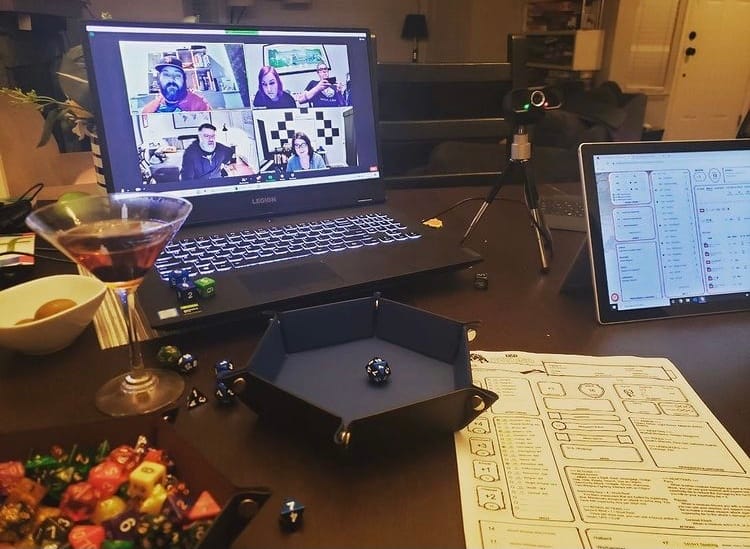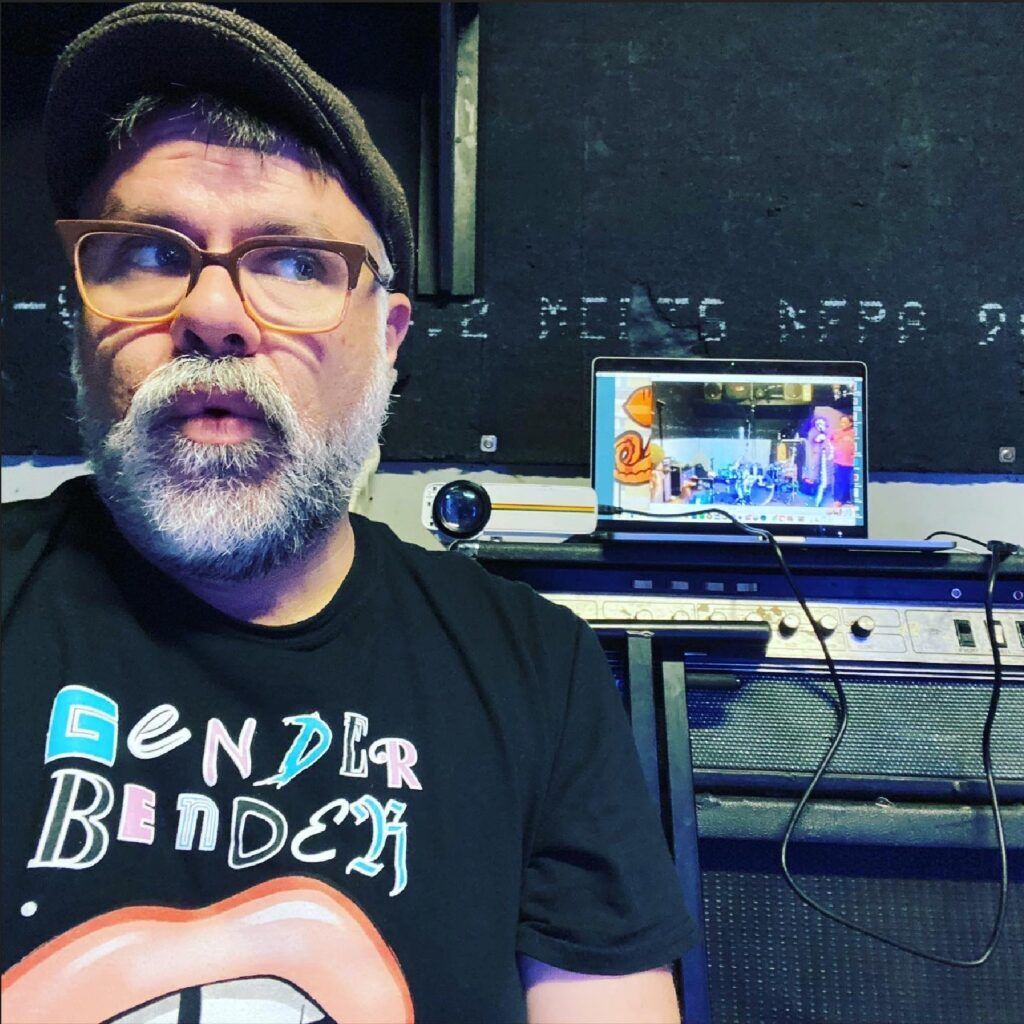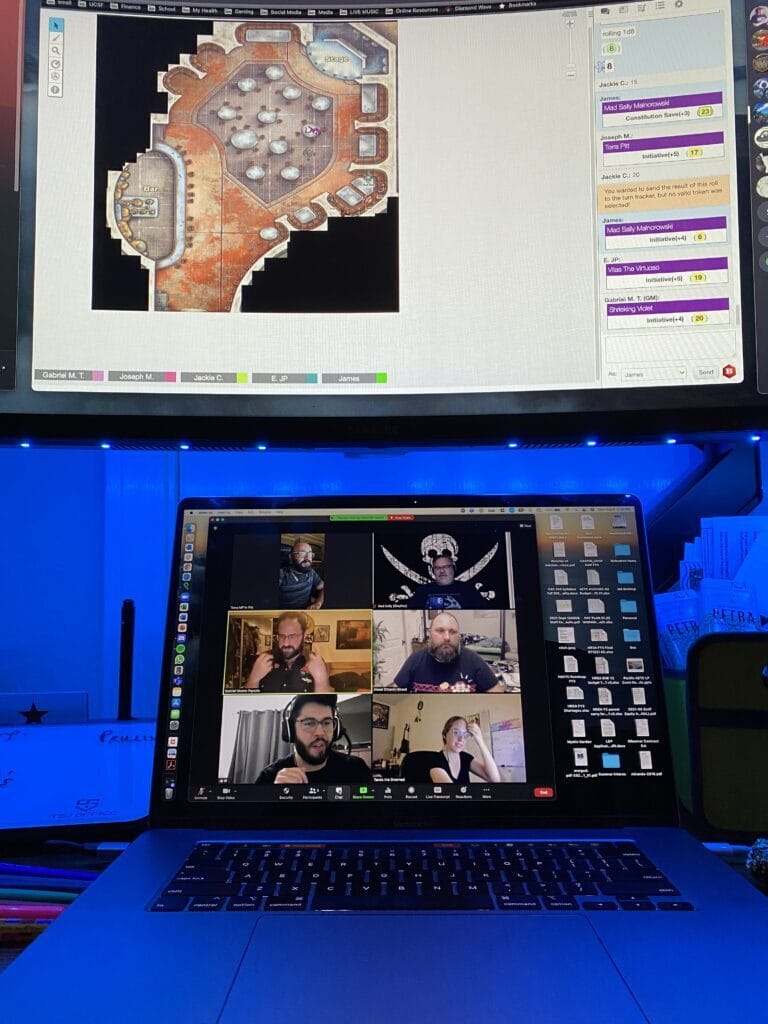
The group of queerdos playing virtual Dungeons & Dragons
Nightlife has always been vital to the LGBTQ+ community because it is one of the places where we are free to be our authentic selves. When Covid shut down nightlife, it hit the queer community hard. Local queer artist James Rouse Iñiguez, ([they/them] a.k.a. DJ Jimmy Swear, a.k.a. Cholula Caliente, a.k.a. bassist of punk drag band Muñecas) stepped up to help alleviate that loss and made a hugely positive impact on a group of queerdos (queer + weirdo) by running virtual Dungeons & Dragons games during the pandemic.
In 2012 James started the monthly party, Fanboy SF, which hosted events centered around nerd culture like Buffy sing-alongs, drag performances and trivia. Through Fanboy SF they began to meet more queer nerds with an interest in table-top role playing games (TTRPGs). At the time James was running the TTRPG game Vampire: The Masquerade, but they transitioned to D&D because it was more versatile. The shift was made in the spirit of community because James wanted to have room for everyone at the gaming table.
In early 2020 James was running 3 games for 12 players. Working in the healthcare industry, they knew that the COVID-19 pandemic would last awhile, so they transitioned to virtual gaming. Aside from the basic learning curve, the transition was pretty smooth with services like DND Beyond, Discord and Roll 20. In those early months of shelter in place, when everything was shut down, James’ D&D games became the only outlet for many of us.
Like any creative expression, our games are rooted in real life. For example the Trump administration was represented by a totalitarian Gnomish regime. And when the pandemic hit a great storm descended on our D&D games, stopping the fantasy world the same way the real world was shuttered. Even though the storm that plagued the games was a metaphor for the pandemic, D&D was an excellent distraction from the real world.

The Dungeon Master James Rouse Iñiguez themself!
The nature of D&D is social, creative and community-based. Being able to still flex all of those muscles relieved some of the tremendous stress & loneliness people were dealing with (and frankly still are). Extroverts needed that outlet more than ever, and with nothing but time on their hands James kicked their games into high gear; increased frequency, new players, new campaigns and even mentoring new Dungeon Masters like myself. At a time when many people were living in isolation we were playing more than ever before, getting our kicks blasting Gnome Nazis with fireballs and making new friends to virtually weather quarantine with.
The game even helped James during one of the toughest times of their life when their mother moved into hospice care and passed away in early 2021. D&D was James’ lifeline during those months. With the community and structure in place, D&D provided a social and recreational outlet that can be hard to create while coping with tremendous loss.
There were other unexpected pluses when we made the switch to virtual gaming. It should come as no surprise that a lot of queerdos (artists, musicians, drag performers, etc.) got priced out of San Francisco since James began running games in 2012. Virtual gaming allowed for the return of veteran players and recruitment of new players who don’t live in the area, giving people a way to combat loneliness from other states and even countries. It turns out that virtual gaming makes D&D even more accessible and allows us to stay connected with people all over, a benefit we will continue to enjoy long after the pandemic.

The fellowship using online tools to play D&D
I barely knew James when I approached them about playing in their D&D games. The first time we spoke about it they said that when they bought their house they wanted to create opportunities for queer nerds to gather, making a much needed space for our communities outside bars and clubs. In the 2 1/2 years since that meeting, James has exceeded my expectations of how welcoming, caring and fun the community can be. They are truly giving back in excess to the niche queer community that James has targeted.
When I interviewed James, they pointed out that nerd culture, specifically folks that play TTRPGs, had some unexpected threads that weave through LGBTQ+ identities. Nowadays, nerd culture is mainstream, but back in the day, it made you an outsider and an easy target for bullying, not unlike being queer. James also spoke about the ways in which D&D can inform queer identity, and vice a versa. It gives you a safe space to deal with real-life stuff creatively and making a character in D&D is a reflection of yourself. Playing through that identity is like exploring part of yourself and being able to “try-on” aspects of identity in a world that is a safe space can be transcendent. I wonder how many young gay nerds had a character background that included loving same-sex relationships, or trans nerds who first heard themselves gendered correctly while playing D&D.
Nerds rule way more now than they did when James or myself were kids in the 80s and 90s. Shows like “Stranger Things” keep Dungeons and Dragons in the pop-culture lexicon, and it might surprise you how enjoyable and therapeutic it can be. If you want to pick James‘s brain about D&D you can attend their workshop on gender and D&D in the Diamond Wave Arts MASCellaneous series this spring. Go here for more info.
The post How Virtual Dungeons & Dragons Helped a Group of “Queerdos” Survive the Pandemic appeared first on Broke-Ass Stuart's Website.







